The Father Answers Our Prayers Because of Jesus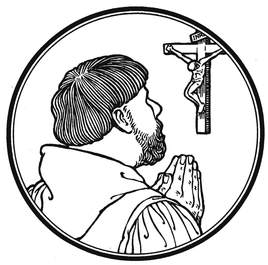
Rogate comes from the Latin rogare which means, “to ask,” a reference to the strong theme of prayer in the Propers (Collect, Lessons, Hymns) for today. In ancient practice, the Monday, Tuesday, and Wednesday prior to the Ascension of Our Lord were known as Rogation Days. These days of early summer were times of special prayer for the protection of the crops. The Major Rogation was on April 25, also the Feast of St. Mark. The Introit for Rogate, “Declare this with a shout of joy, proclaim it, send it out to the end of the earth;…” is from Isaiah 48:20, a joyful proclamation of the freedom of Israel from the Babylonian captivity, and of God’s gracious deliverance of His people. The Gospel for Rogate, like those for the preceding Sundays--Cantate and Jubilate—all point to the Ascension, and hence point the eyes of the faithful to our risen Lord’s eternal reign in heaven.
To pray in Jesus’ name is to pray as one who has been baptized. For it is in the water that He put His name upon you, claiming you as His own, making you a son of God with access to the Father. By His incarnation and crucifixion, our Lord Jesus broke through the barrier of sin which separated us from God, opening a portal to the Father. Like Moses in the wilderness, Jesus is our go-between and intercessor before the throne of heaven. He was lifted up for us on the cross that we might be saved and restored to fellowship with the Father. Looking into this perfect teaching of liberty we pray with boldness and confidence as dear children of God.
0 Comments
Jesus Promises to Send His Holy Spirit, the Helper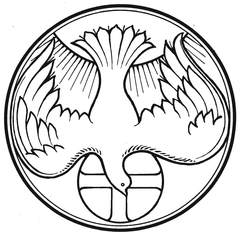
Cantate means “sing.” This is the first word of Psalm 98, appointed for this day. Psalm 98 is a joyous psalm that ascribes glory and praise to God for His great redemptive work—giving His only-begotten Son Jesus Christ to die for the sins of the world, and then to rise to new life on the first Easter morning. Christ is the Right Hand and Holy Arm of God, God in the flesh. Christ is the Righteousness revealed to the nations. Christ is our salvation, “the salvation of our God.” By God’s grace through faith in Jesus Christ, we, like all Christians of all time, are saved. Those who follow the propers carefully will note that the Gospel readings appointed for Jubilate (last week), Cantate (this week), and Rogate (next week) are all from the sixteenth chapter of St. John.
Today we get to sing to the Lord the “new song” born from the marvelous things and the salvation Our Lord openly shows (Psalm of the Day). This salvation is the Holy Spirit who is the “good and perfect gift from above” (Second Lesson). The Spirit’s salvation is to guide us into all truth (Gospel). And by the Spirit we pray the Father that we may “love what you command and desire what you promise” (Collect).
Those Who Wait on the Lord Shall Rejoice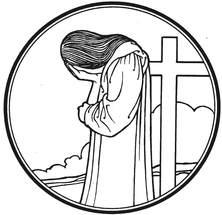
Jubilate means “Make a joyful shout,” from the first verse of Psalm 66. This Psalm expresses the joy and thanksgiving that are the response of faith to God’s creative and redemptive acts. This joyful Psalm attributes praise and glory to God alone, for it is He that “turned sea into dry land” to deliver His people form bondage through the Red Sea, and it is He that keeps our soul among the living,” delivering His people from bondage to sin and death by the waters of Holy Baptism. He alone is worthy of our worship and prayers. “But certainly God has heard me; He has attended to the voice of my prayer. Blessed be God, who has not turned away my prayer, nor His mercy from me!”
The people of God are pilgrims and sojourners in this world, looking ahead to a destination yet to come. We are those who wait on the Lord. But, Jesus tells us that the wait is just a little while. Though you must experience sorrow for a time, though you must live as strangers in a world that is at enmity with Christ, yet your sorrow will be turned to joy when He returns. The little while of weeping shall be replaced with an eternity of rejoicing in the presence of Christ the crucified and risen Savior.
The Good Shepherd Cares for His Sheep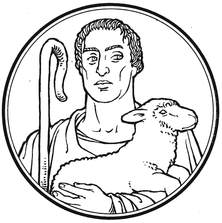
Our Lord Jesus is the Good Shepherd (John 10:11–16). He is not like the hireling, who cares nothing for the sheep and only for himself, who flees when he sees the wolf coming. Rather, Jesus is the Good Shepherd who seeks out His scattered sheep to deliver them (Ezek. 34:11–16). He gathers them and feeds them in rich pasture. He binds up the broken and strengthens the sick. He lays down His life for wandering and wayward sheep. On the cross, Christ bore in His body the attacks of the predators of sin and death and the devil for you that you might be saved. He now lives to restore your soul in the still waters of baptism, to lead you in the paths of righteousness by the voice of His Gospel, to prepare the table of His holy supper before you, that you may dwell in the house of the Lord forever (Psalm 23). “For you were straying like sheep, but have now returned to the Shepherd and Overseer of your souls” (1 Peter 2:25).
Misericordia Domini means “the goodness of the Lord.” These are words that end the Historic Introit (meaning, “entrance;” a Psalm or verse sung as the pastor entered the church) for the day, Psalm 33:5. In Latin, verse 5 ends “misericordia Domini plena est terra”—“the earth is full of the goodness of the Lord.” Psalm 33 proclaims the joy and awe of the Christian at the miraculous grandeur of the creative and redemptive acts of Our Lord. Misericordia Domini is frequently called “Good Shepherd Sunday” because the Gospel reading is John 10:11-16, where our Lord identifies Himself as our Good Shepherd. St. Gregory the Great once said, ““The Good Shepherd has laid down his life for his sheep in order to change his body and blood into a sacrament for us, and to satisfy the sheep he had redeemed with his own body as food.” Christ as our Shepherd is also the theme of the Old Testament (Ezekiel 34.11 -16) and the Epistle (1 Peter 2.21-25).
The Wounds of Christ Give Us Life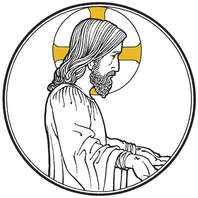
Quasimodo Geniti is the Latin name for today, which means, “like newborn babes.” [It’s actually three words in Latin: Quasi modo geniti]. These words of 1 Peter 2:2 begin the Introit for the First Sunday after Easter: “Like newborn babies, crave the pure milk of the Word so that by it you may grow up with the result being salvation.” Historically, those preparing for baptism and confirmation would attend and observe the Easter Vigil, during which they would be baptized and received into the Holy Christian Church after dark on Holy Saturday. These new Christians would continue in their instruction “as newborn babes” in the faith. It is the Word of God through the preached Word and the Sacraments that sustain the Christian. Would that we all might become as “little children” (Mt. 18:3), with child-like faith believing the Word, and, as newborn babies, “crave the pure milk of the Word,” that we too may “grow up,” and thus be prepared for the “meat”—the deeper truths of the faith and the mysteries of God (1 Cor. 3:2, 4:1; Heb. 5:12-14).
Christ’s Resurrection Brings Us Life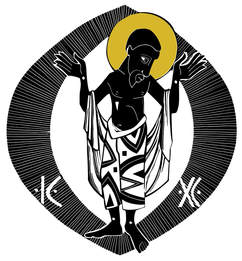
“Christ, our Passover lamb, has been sacrificed” (1 Cor. 5:7). By the shed blood of Christ, the Lamb of God, eternal death has passed over us. Now we pass with Christ through death into life everlasting. For Christ the crucified One is risen! The stone has been rolled away from the tomb, revealing that the tomb could not hold Him (Mk. 16:1–8). Now our Redeemer lives eternally to save us from sin and Satan and the grave, and we can live in the sure hope of our own bodily resurrection with Christ. “After my skin has been thus destroyed, yet in my flesh I shall see God” (Job 19:26). Feasting on the living Christ, who is our meat and drink indeed, we boldly say: “O death, where is your victory? O death, where is your sting?…But thanks be to God, who gives us the victory through our Lord Jesus Christ” (1 Cor. 15:54–55, 57).
The Paschal Candle is a special candle used at every service during the Easter season and at baptisms and funerals year-round. The Paschal Candle—rededicated last evening in our Easter Vigil service—symbolizes the resurrection victory over the darkness of sin and death. It emphasizes the presence of the resurrected Christ and the link between a believer’s baptism and the resurrection (Romans 6). The name Paschal comes from the Greek, pascha. Before the time of Christ, this word was used for Passover; after Christ, Christians took to using the word when referring to the Festival of the Resurrection (The term Easter came into use in later centuries). On the Paschal Candle are nails, symbolizing the wounds of Christ; a cross, the means by which we are saved through our baptism; two Greek letters, an Alpha [Α] and an Omega [Ω], which remind us of Jesus’ words in St. John’s Revelation (1:8; 22:13), and that he is the beginning and the end; and finally, the candle has the current year, the year of our Lord (“anno domini"; A.D.) 2017. Throughout the fifty days of Easter, the Paschal Candle traditionally stands near or in front of the altar as a symbol of resurrection. It is lighted for each service and is traditionally extinguished after the reading of the Gospel on Ascension. The Paschal Candle is of substantial size so its important symbolism speaks clearly. Even the stand in which it sits is of great size. As the Ad-vent candles bring wonderful meaning to the celebration of Advent, so the Paschal Candle is intended to add meaningful symbolism to our celebration of Easter, Baptisms, and Christian funerals.
The Season of Easter draws to a close with a look at Jesus’ High Priestly prayer. Now as then, our risen and ascended Lord Jesus prays for Spirit-inspired unity between the Father and his church. With much anticipation, we look for the coming of the Holy Spirit, confidently living a new life of faith in our ascended Lord.
Forty days ago, the darkness of Lent was dispelled by the light of Easter. For forty days, the Church has cried, “Christ is risen! He is risen indeed!” But forty days after Jesus rose from the dead, he departed from his disciples and was enthroned in glory in heaven. From heaven he rules all things as our Lord and King. Today we celebrate the day he ascended (“went up”) to glory. But he promised not to leave his disciples alone. He promised to send them the Holy Spirit. They waited ten more days, and then on the Festival of Pentecost (“fiftieth day”) they saw Jesus’ promise made good. Next Sunday, we will celebrate that 50th day, the day of Pentecost.
Jesus had told them that he was leaving. Today, John gives us a picture of it, and what it will be like when we join Jesus there. St. John gives a vision of the new heaven and the new earth, the home beautifully crafted and lovingly prepared for the Bride of Christ. Here there is nothing of the old sin, death and pain. All is new for all is done. So now, even in the face of persecution, love led the apostles to boldly proclaim the message of the risen Christ. Filled with joy and the Spirit, Christ’s love compels us to proclaim the same Word of Life.
The paradox of Christ is that he is both Lamb and Shepherd. He saves his flock, by shedding his blood as the Lamb sacrificed for sin. This is the Good Shepherd we needed: God in the flesh, sacrificed for our atonement. But now, washed in his blood, the white robed host is led by the Shepherd-Lamb to the springs of living water and a life where everything that once was wrong is made right forever.
|
Archives
February 2019
Categories
All
|
||||||||||||||||||||||||||||||||||||||||||||||||||||||||||||

 RSS Feed
RSS Feed
